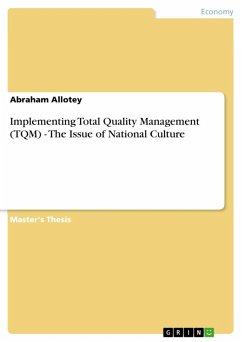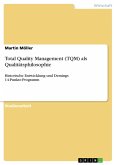Master's Thesis from the year 2003 in the subject Business economics - Business Management, Corporate Governance, grade: 70%, University of East London (East London Business School), course: Master of Business Administration, language: English, abstract: Total Quality Management has worked in Japan, so why shouldn't it work in the USA, Europe or Africa? This is a very popular statement amongst many multinational companies when they want to implement quality strategies in different countries. They usually ignore the importance of culture and its impact on transplanting quality strategies that has been successful in one cultural set up. This is one of the main reasons why TQM has not worked in many countries. The compatibility of TQM with different cultures should always be reviewed since work ethics for instance in Ghana is different from that in Japan. Culture reflects the way of life, values, and beliefs of a society and as such very difficult to change but rather can be slightly modified through education and training to adapt to certain quality management strategies. This claim of the impact of national culture, on the successful TQM implementation across national boundaries forms the basis of this management report. In this report therefore, literature on both TQM and culture will be critically discussed in the first two chapters. The third chapter will critically analyze the literature on the impact of culture in the successful implementation of TQM across different countries. Chapter four will analyze the managerial implications and finally a conclusion and recommendation will be drawn. [...]
Dieser Download kann aus rechtlichen Gründen nur mit Rechnungsadresse in A, B, BG, CY, CZ, D, DK, EW, E, FIN, F, GR, HR, H, IRL, I, LT, L, LR, M, NL, PL, P, R, S, SLO, SK ausgeliefert werden.









